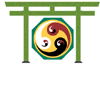
A Book of Little Traditions

|
minzoku NEO-shintô A Book of Little Traditions |
|
|
ToC |
||
|
Blog — 38
Some Thoughts On minzoku shintô And XOR Religions
For the most part the practice of religion in Japan is pluralistic — one is born shintô, frequently married kurisuchan (Christian), and dies butsu. Each religion is used for those life events it is 'best' known for.
Encapsulating nine or ten different sets of religious practices, minzoku shintô epitomizes this attitude, and in many ways is the antithesis of the XOR Religions.
XOR or 'eXclusive OR' religions usually approach life as a zero-sum game — for someone to suceed, someone else has to lose.
To join, one is required to accept their particular belief system and to eschew all others. They're 'right', and everyone else has to be 'wrong'. "It's either their way, or the highway."
On the other hand in minzoku shintô "Any way that works is a highway"; in large part because it is not based on belief, but rather on practices and feelings.
Pragmatically, if a practice works, it is adopted and adapted. And if a practice, rite, or ceremony evokes feelings of awe, reverence, gratitude, or terror (evidence of the presence of kami) it too is adopted.
While minzoku shintô practitioners have 'beliefs', these are on a personal basis and vary from person to person. minzoku shintô has no requirement to surrender one set of beliefs for another; and thus easily works with other religions instead in opposition to them.
In minzoku shintô, ethics and morals are also on an individual basis; there is no single set that all shintôists are required to adhere to.
Most ethics and morals are based on jukyô, which has both good and some not so good points. While it provides a 'strong' moral compass for actions within the 'in' group, it is ambiguous about actions with 'out' groups. It promotes social cohesion and harmony within family and community, but sometimes does so at the expense of individual growth and freedom.
|
||
|
|